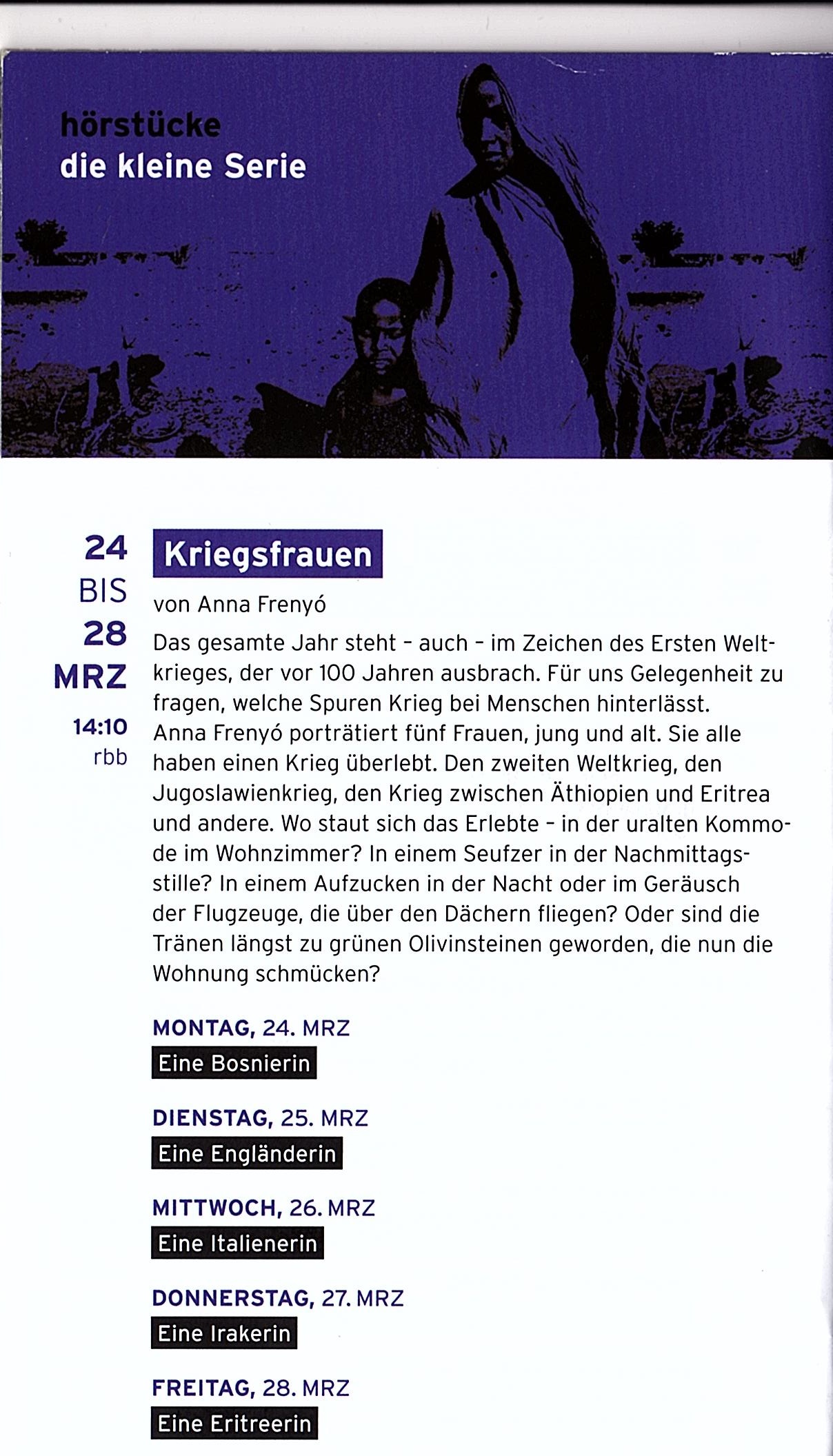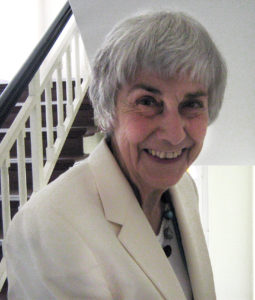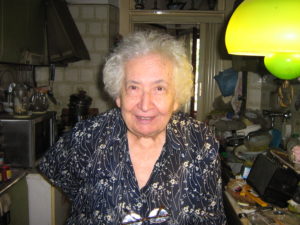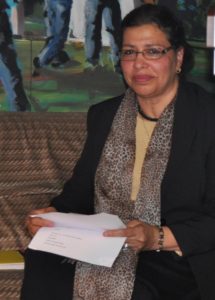KRIEGSFRAUEN, EINE HÖRSTÜCKREIHE
RBB Kulturradio I 2014

Eine Kroatin, eine Engländerin, eine Bosnierin, eine Irakerin und eine Italienerin.
 Begzada Alatovic kam während des Jugoslawienkrieges aus der bosnischen Stadt Modrica als Flüchtling nach Deutschland. Heute arbeitet sie im Interkulturellen Garten Rosenduft bei Berlin Gleisdreieck. Hier leitet sie das Projekt des Vereins Südosteuropa Kultur, das bosnische Flüchtlingsfrauen zusammenbringt, um ihnen durch die Beschäftigung im Garten zu helfen, ihre Kriegserlebnisse zu verarbeiten und Gemeinschaft zu finden.
Begzada Alatovic kam während des Jugoslawienkrieges aus der bosnischen Stadt Modrica als Flüchtling nach Deutschland. Heute arbeitet sie im Interkulturellen Garten Rosenduft bei Berlin Gleisdreieck. Hier leitet sie das Projekt des Vereins Südosteuropa Kultur, das bosnische Flüchtlingsfrauen zusammenbringt, um ihnen durch die Beschäftigung im Garten zu helfen, ihre Kriegserlebnisse zu verarbeiten und Gemeinschaft zu finden.
 April Canning ist 83 Jahre alt. Sie hat den Krieg als kleines Mädchen in der Nähe von London erlebt. Als junge Frau wollte sie Schauspielerin werden, doch in der Nachkriegszeit konnte sie ihren Traum nicht verwirklichen. Sie hat geheiratet und Kinder bekommen. Dennoch wollte die ehemalige Kriegsfrau aus der Ohnmacht der Umstände heraustreten und selber die Welt bewegen können. Mit 60 Jahren ist sie einfach gegangen. Sie hat in Polen und in Ungarn gelebt, Englisch unterrichtet, dann mit 80 ein Masterstudium in Literatur absolviert. Jetzt lebt sie in der Nähe von Manchester und ist sehr aktiv. Anna Frenyo traf sie in der Apotheke zum Rezepte-Abholen. Danach gab es erstmal einen Whiskey bei April zu Hause.
April Canning ist 83 Jahre alt. Sie hat den Krieg als kleines Mädchen in der Nähe von London erlebt. Als junge Frau wollte sie Schauspielerin werden, doch in der Nachkriegszeit konnte sie ihren Traum nicht verwirklichen. Sie hat geheiratet und Kinder bekommen. Dennoch wollte die ehemalige Kriegsfrau aus der Ohnmacht der Umstände heraustreten und selber die Welt bewegen können. Mit 60 Jahren ist sie einfach gegangen. Sie hat in Polen und in Ungarn gelebt, Englisch unterrichtet, dann mit 80 ein Masterstudium in Literatur absolviert. Jetzt lebt sie in der Nähe von Manchester und ist sehr aktiv. Anna Frenyo traf sie in der Apotheke zum Rezepte-Abholen. Danach gab es erstmal einen Whiskey bei April zu Hause.
Well, I was 9 when the war broke out. It was a Sunday morning, I’m pretty sure it was Sunday, weekend anyway, ‘39, September the 3rd? I don’t know, I’ve forgotten, sorry. And I’d been reading in bed, it was a sunny morning and I’d just got a thin nighty on and a bit of a housecoat, and I remember coming downstairs when I realised that things were getting serious. And I can remember Neville Chamberlain saying: I regret to say that England is now at war. I can remember it, where I was, where my mother was sitting, where my father… The worst thing were these what we called buzz bombs, I forget what they were called Blitz… Blitz, yes, because you could hear them coming and then there’d be dead silence … and you wouldn’t know where that bomb was going to drop. So imagine absolute silence…, and if there was a tremendous bolt of sound, you would say, God, that’s near… and you would realise you were alright. if it was distant, you’d say: oh, they’ve gone over, thank God. That was the worst part. If an aeroplane came and suddenly dropped a bomb on you, you hadn’t time to think. That was the worst, the buzz bombs. Just waiting… not knowing… whether you were gonna live the next day or not!
Life carried on, you just had classes in the cloakrooms where there were no windows, they were in the lower ground of the school, the lowest storey, and we just had classrooms, sitting under our pegs, with our gasmasks on the hook above our heads. It was amazing. But you just carried on. People did. The English are like that, you know, they are pretty phlegmatic, they just go and get on with it.
But it must have put a moral fibre into you … I queued up for an orange all morning… I remember my ration book. I stood in the cold and got one orange per ration book. and you wouldn’t see another orange for another six weeks. It didn’t hurt us any. I think I brought my kids up and probably most of my peers would have done… not to depend…
Two guys turned up the other day, in uniform, they said, we’ve got something to do with the gas and I said, do come in, two guys at once in my flat, how great, why not? Yes, I flirt, I can flirt with anybody and have a good laugh, and I think, April, behave yourself! I see no reason why anybody should give up unless they’ve got something horribly wrong with them.
 Zia Carla ist eine 82 jährige Mailänderin, die verwitwet ist und mit ihrer kleinen Hündin alleine lebt – in der Via Tiepolo, im Zentrum von Mailand, in einem alten Haus mit Marmortreppen. Zia Carla verbringt die meisten Tage in ihrer Wohnung, guckt Fernsehen oder kocht für den Hund. Sie war Damenschneiderin in einem vornehmen Salon – ihre kleine Wohnung ist voller Kleidungsstücke an denen sie ab und zu arbeitet, um ihre Rente aufzubessern. Sie hat den zweiten Weltkrieg als junges Mädchen erlebt, und diese Erinnerungen bestimmen ihr Leben bis heute.
Zia Carla ist eine 82 jährige Mailänderin, die verwitwet ist und mit ihrer kleinen Hündin alleine lebt – in der Via Tiepolo, im Zentrum von Mailand, in einem alten Haus mit Marmortreppen. Zia Carla verbringt die meisten Tage in ihrer Wohnung, guckt Fernsehen oder kocht für den Hund. Sie war Damenschneiderin in einem vornehmen Salon – ihre kleine Wohnung ist voller Kleidungsstücke an denen sie ab und zu arbeitet, um ihre Rente aufzubessern. Sie hat den zweiten Weltkrieg als junges Mädchen erlebt, und diese Erinnerungen bestimmen ihr Leben bis heute.
Il cano. Ogni tanto vuol buttarmi giu dall letto. Ogni tanto ce la fa. Perché io dormo sempre sul bordo. Anche da bambina, dormivo sul bordo. Anche se dormivo nel mio lettino, ma ero sempre sul bordo.Forse è una cosa che m’è rimasta del tempo di guerra. Non lo so. Perchè, quando c’erano i bombardamenti, suonava l’allarme. Ma prima dell’allarme si sentiva un leggero fischio. Io sentivo quello. Il preallarme, perché cominciava con “liiiiiiii”… un sibilo leggero. Poi suonava l’allarme. Io sentivo quel sibilo e in un attimo ero vestita, va ben che andavamo a letto quasi mezzi vestiti. Era una cosa tremenda. Perché avevo una paura… ero terrorizzata, io. Dall’… dall’ agosto del 43. Perché prima c’erano qualche bombardamento ma… ma in agosto del 43 è stato tremendo. Sono venuti bombardamenti che hanno… distrutto mezza Milano. Ci son stati tanti morti anche. Per questo che spero che non vengano altre guerra, perché quando sente che cominciano a fare i cretini…
Anna Frenyo: Tu credi al destino?
Zia Carla: Sì. Non succede niente se non è già scritto. Inutile che tu stai li a pensare. Quando c’erano i bombardamenti, è caduto un grappolo di bombe proprio, perchè è caduto un’aeroplano, un grappolo, è caduto su un, una casa che c’era, non so, 50-60 inquilini. C’è n’era uno che era un ubriacone, dormiva sulla… nell’abbaino. Dormiva lì, é caduta la bomba. Lui si è trovato in mezzo la strada sul letto, e ha continuato a dormire. E la casa l’ha vissuta c’è stato 400 morti, che 40 sono ancora sotto. Lui, ubriaco fradicio, sunch che dormiva praticamente sotto tetto, era li, mezza la strada, vivo. Ha continuato a dormire, malgrado è volato giù con il letto.
Anna Frenyo: Incredibile.
Zia Carla: Il destino. Non c’è niente da fare.
Anna Frenyo: Ma quali sono le mie decisioni?
Zia Carla: Tu puoi decidere, ma se il tuo destino e diverso, tu puoi decidere quello che vuoi ma ti succederà. Sono un po strana, e vero?
Anna Frenyo: Un po’.

Wafaa Salman musste 1979 aus dem Irak vor Ausbruch des Krieges fliehen. Sie und ihr Mann lebten fünf Jahre in Algerien, dort wurde sie Juristin und hat ihr erstes Kind bekommen. Doch sie mussten wieder weiter, nach Jemen, zweites Kind, und als die Lage dort auch heikel wurde, nach Deutschland. Wafaa ist heute 57, Dichterin und lebt alleine in Berlin. Sie organisiert den Irakischen Kulturverein und schreibt als Journalistin über die Lage im Irak. Die Sehnsucht nach der Heimat lässt sie nicht los, doch einen Weg zurück gibt es nicht mehr.
 Jelena ist heute 25 Jahre alt. Ihre Mutter kommt aus Indien, ihr Vater aus Ägypten. Die beiden verliebten sich in Kroatien, deswegen kam Jelena als Kroatin auf die Welt. Als dreijähriges Mädchen musste sie dem Jugoslawienkrieg entfliehen. Über die grüne Grenze Ungarns kamen sie und ihre Familie nach Deutschland, wo sie schließlich eine Zuflucht und eine Bleibe fanden. In der Hörstückreihe Kriegsfrauen von Anna Frenyo fragen wir danach, wie eine Frau trotz des Kriegserlebnisses weiterleben und Lebensfreude und Kraft ausstrahlen kann.
Jelena ist heute 25 Jahre alt. Ihre Mutter kommt aus Indien, ihr Vater aus Ägypten. Die beiden verliebten sich in Kroatien, deswegen kam Jelena als Kroatin auf die Welt. Als dreijähriges Mädchen musste sie dem Jugoslawienkrieg entfliehen. Über die grüne Grenze Ungarns kamen sie und ihre Familie nach Deutschland, wo sie schließlich eine Zuflucht und eine Bleibe fanden. In der Hörstückreihe Kriegsfrauen von Anna Frenyo fragen wir danach, wie eine Frau trotz des Kriegserlebnisses weiterleben und Lebensfreude und Kraft ausstrahlen kann.
